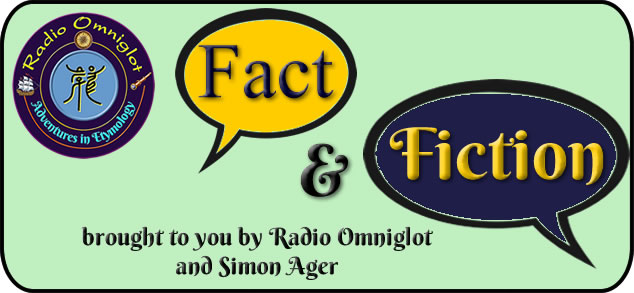Podcast Episode Details
Back to Podcast Episodes
Adventures in Etymology - Fact & Fiction
Season 1 Episode 166
In this Adventure in Etymology we’re uncovering some facts about the words fact and fiction.

Meanings of fact [fækt] include:
- Something actual as opposed to invented.
- Something which is real.
- Something concrete used as a basis for further interpretation.
- An objective consensus on a fundamental reality that has been agreed on by a substantial number of experts.
It comes from Old French fact, from Latin factum (fact, deed, act), from faciō (to do, make, construct), from Proto-Italic *fakjō (to make), from Proto-Indo-European *dʰh₁k-yé-ti (to put, place), from *dʰeh₁- (to do, put, place) [source].
Words from the same roots include affair, benefit, credit, deed, factory, family, perfect, thesis and tick in English, fare (to do, make, create) in Italian, hacer (to do, make) in Spanish, Ort (place, location, town) in German, дело (delo – affair, work, deed) in Russian, dáil (betrothal, legislature, Irish parliament) in Irish, and dadl (argument, debate, controversy) in Welsh [source].
Meanings of fiction [ˈfɪk.ʃən] include:
- A type of literature using invented or imaginative writing, instead of real facts, usually written as prose.
- A verbal or written account that is not based on actual events (often intended to mislead)
It comes from Middle English ficcioun [ˈfiksjun] (an invention or fabrication), Old French ficcion (dissimulation, ruse, invention), from Latin fictiō (fashioning, forming, fiction), from fingō [ˈfɪŋ.ɡoː] (to shape, fashion, form), from Proto-Italic *fingō / θingō (to knead, form), from Proto-Indo-European *dʰi-né-ǵʰ-ti, from *dʰeyǵʰ- (to knead, form, shape) [source].
Words from the same roots include dough, feign, feint, figment, figure and lady in English, Teig (dough, paste, pastry, batter) in German, देह (deh – body, person) in Hindi, and fingere (to pretend, feign, dissemble) in Italian [source].
Incidentally, in Old English one word for fiction, and also false news or a made-up story, was lēasspell [ˈlæ͜ɑːsˌspeɫ], which comes from lēas (false, vain, worthless, a lie, mistake) and spell (story, news, argument) [source].
Lēas lives on in the English dialect word lease (to tell lies, slander) [source], and spell in gospel and (to) spell [source].
The opposite was sōþspell [ˈsoːθˌspeɫ] (a true story, nonfiction, history), which comes from sōþ (true, real, truth) and spell (story, news, argument) [source].
The English word
Published on 2 weeks, 1 day ago